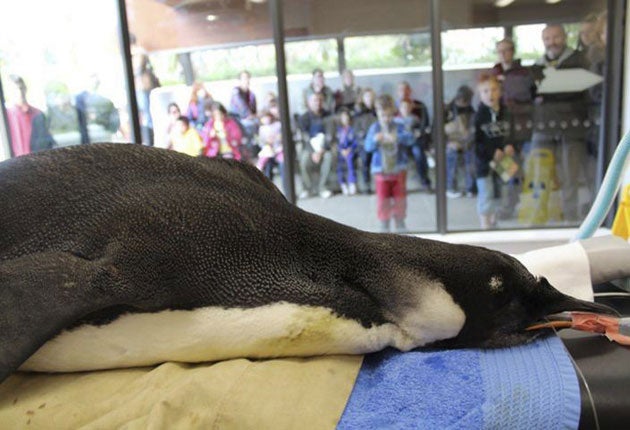Your support helps us to tell the story
From reproductive rights to climate change to Big Tech, The Independent is on the ground when the story is developing. Whether it's investigating the financials of Elon Musk's pro-Trump PAC or producing our latest documentary, 'The A Word', which shines a light on the American women fighting for reproductive rights, we know how important it is to parse out the facts from the messaging.
At such a critical moment in US history, we need reporters on the ground. Your donation allows us to keep sending journalists to speak to both sides of the story.
The Independent is trusted by Americans across the entire political spectrum. And unlike many other quality news outlets, we choose not to lock Americans out of our reporting and analysis with paywalls. We believe quality journalism should be available to everyone, paid for by those who can afford it.
Your support makes all the difference.An Antarctic penguin which ended up stranded and eating sand on a New Zealand beach is recovering after a very human treatment - an endoscopy.
Officials said it could be months before the young emperor penguin, which has been dubbed Happy Feet, recovers.
Experts guided a camera on a tube through the penguin's swollen intestines and flushed its stomach to remove the swallowed sand, which it had apparently mistaken for snow. Penguins eat snow to hydrate themselves.
Wellington Zoo spokeswoman Kate Baker said the penguin is now dining on fish slurry.
The bird arrived on Peka Peka Beach, about 40 miles (65km) north-west of Wellington last Monday, the first time in 44 years that an emperor penguin has been spotted in the wild in New Zealand.
Conservation official Peter Simpson said it could remain at the zoo for three more months while it recovers.
To ensure the health of its newest star, the zoo brought in Wellington Hospital specialist John Wyeth - who usually only operates only on humans - to help with the endoscopy procedure, New Zealand Press Association reported.
Today's operation went well, and doctors removed about half of the remaining sand and several twigs from the bird's digestive system, Ms Baker said .
An X-ray is scheduled for Wednesday, but medical staff hope the penguin will be able to pass naturally the rest of the debris blocking its system.
"It's positive news, but he's definitely not out of the woods yet," Ms Baker said.
The bird is being housed in a room at the zoo chilled to about 46F (8C), she added, and has a bed of ice to sleep on.
What's next for Happy Feet still remains to be decided.
Mr Simpson said he is meeting penguin experts at the zoo on Wednesday to consider options. He said it is not simply a matter of putting the penguin back into the ocean off New Zealand's coast.
"There's no great rush to decide," he said. "It will most likely need more medical work over the next three months."
Gareth Morgan, a New Zealand investment adviser, has offered to transport the penguin back to Antarctica next February when he leads an expedition to the southern continent. But Mr Simpson said that, while officials appreciate the offer, they may want to act before then.
Mr Simpson said the penguin may be older than experts first thought - perhaps up to two and a half years old rather than the initial estimate of 10 months. It stands about 3ft (80cm) tall.
Experts still do not know if it is a male or female, Mr Simpson said, although DNA samples should soon provide an answer.

Join our commenting forum
Join thought-provoking conversations, follow other Independent readers and see their replies
Comments